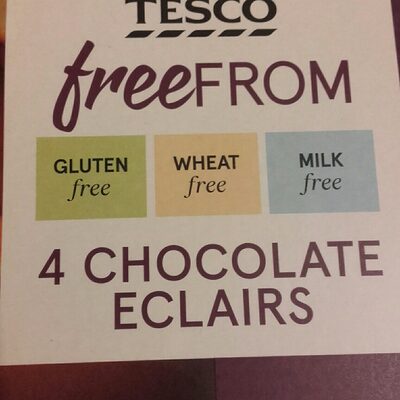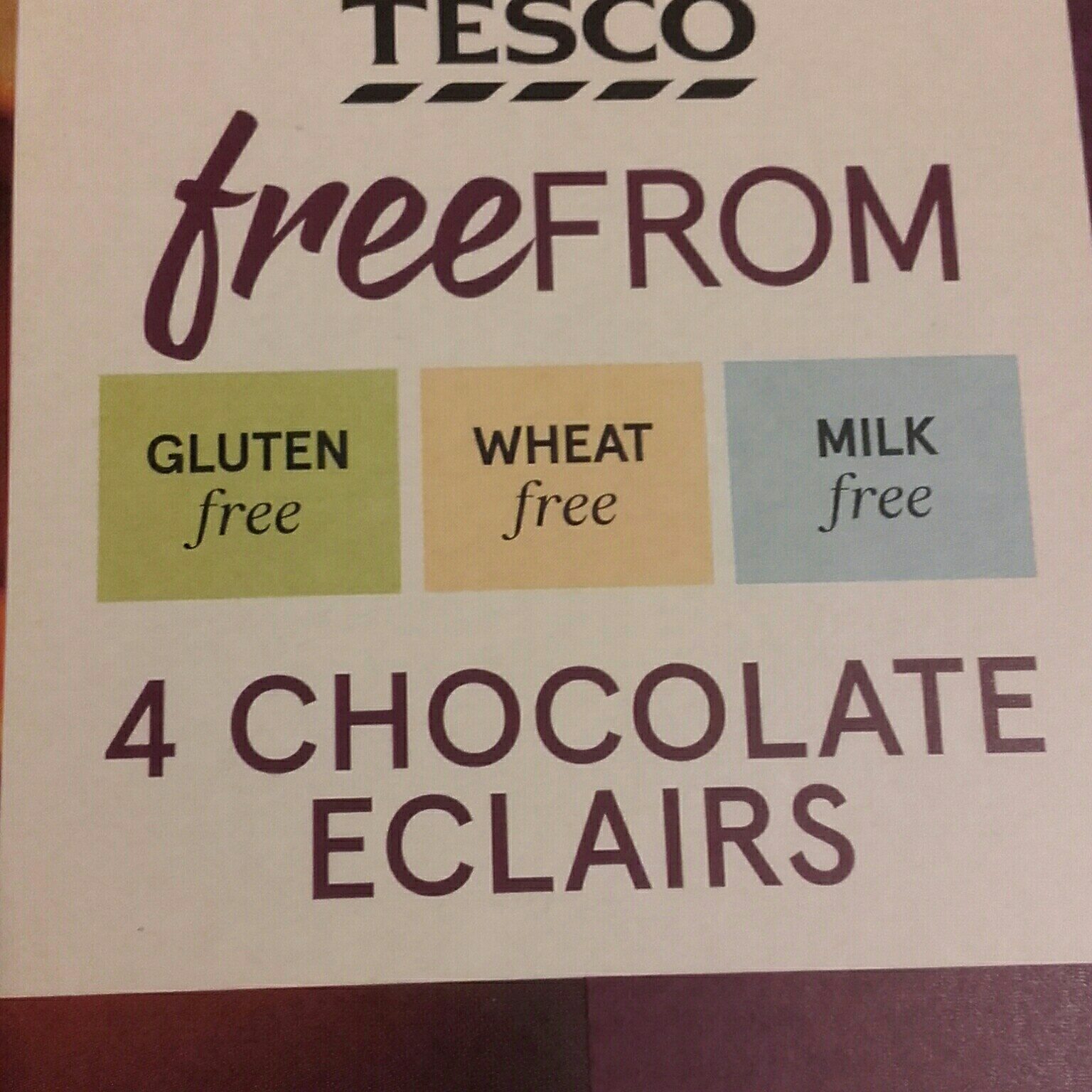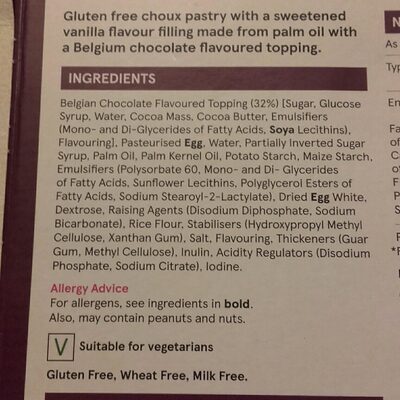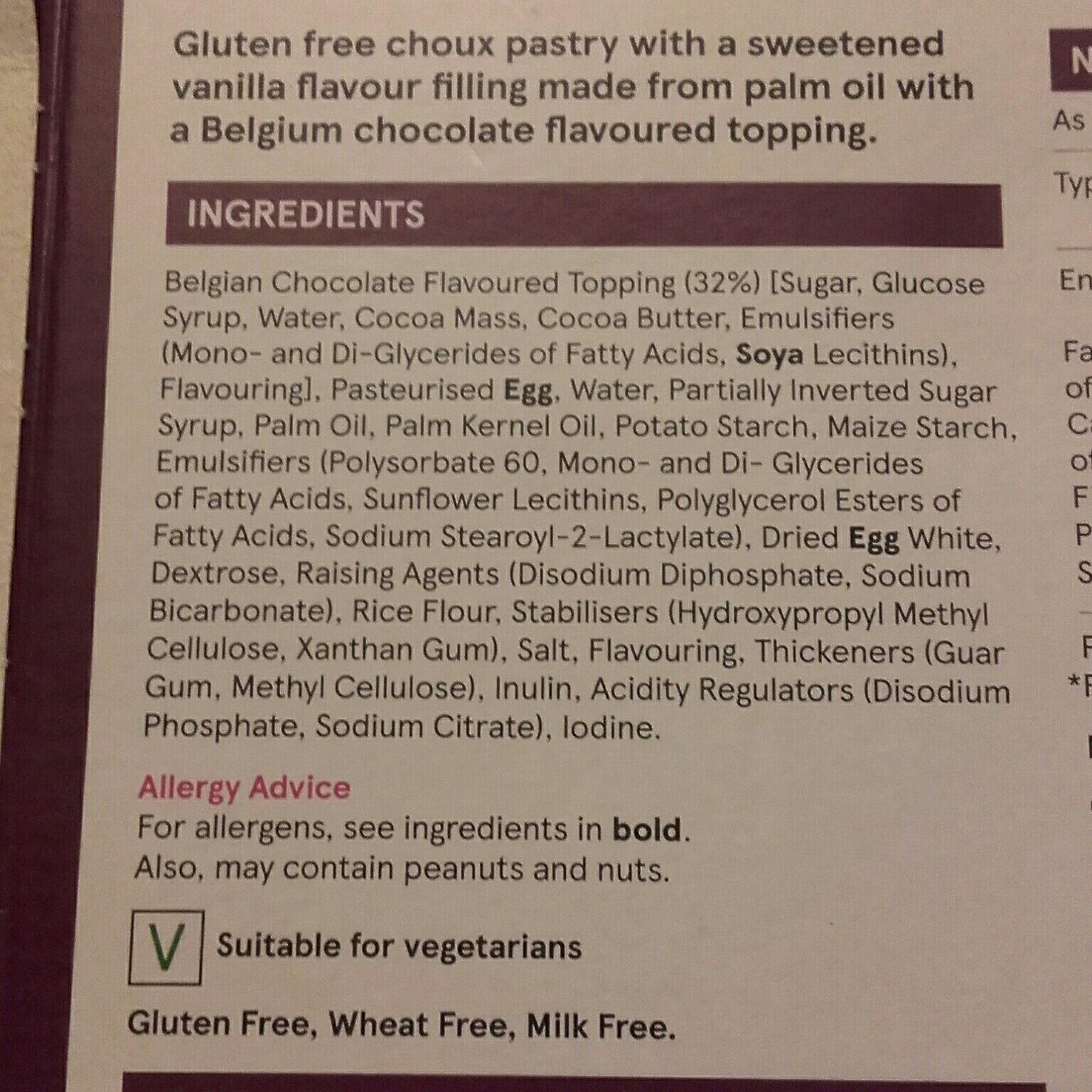Help us make food transparency the norm!
As a non-profit organization, we depend on your donations to continue informing consumers around the world about what they eat.
The food revolution starts with you!
free from 4 chocolate eclairs - Tesco
free from 4 chocolate eclairs - Tesco
This product page is not complete. You can help to complete it by editing it and adding more data from the photos we have, or by taking more photos using the app for Android or iPhone/iPad. Thank you!
×
Barcode: 5057545028384 (EAN / EAN-13)
Packaging: Card-box
Brands: Tesco
Categories: Snacks, Sweet snacks, Biscuits and cakes, Pastries, Eclairs, Chocolate eclairs
Labels, certifications, awards: No gluten, No milk, Verified
Stores: Tesco
Countries where sold: United Kingdom
Matching with your preferences
Health
Ingredients
-
42 ingredients
belgian chocolate flavoured topping (32%) [sugar, glucose syrup, water, cocoa mass, cocoa butter, emulsifiers (mono - and diglycerides of fatty acids, soya lecithins), flavouring, pasteurised egg, water, partially inverted sugar syrup, palm oil, palm kernel oil, potato starch, maize starch, emulsifiers (polysorbate 60, mono - and diglycerides of fatty acids, sunflower lecithins, polyglycerol esters of fatty acids, sodium stearoyl-2-lactylate), dried egg white, dextrose, raising agents (disodium diphosphate, sodium bicarbonate), rice flour, stabilisers (hydroxypropyl methyl cellulose, xanthan gum), salt, flavouring, thickeners (guar gum, methyl cellulose), inulin, acidity regulators (disodium phosphate, sodium citrate), iodineAllergens: Soybeans
Food processing
-
Ultra processed foods
Elements that indicate the product is in the 4 - Ultra processed food and drink products group:
- Additive: E322 - Lecithins
- Additive: E412 - Guar gum
- Additive: E415 - Xanthan gum
- Additive: E435 - Polyoxyethylene sorbitan monostearate
- Additive: E450 - Diphosphates
- Additive: E461 - Methyl cellulose
- Additive: E464 - Hydroxypropyl methyl cellulose
- Additive: E471 - Mono- and diglycerides of fatty acids
- Additive: E475 - Polyglycerol esters of fatty acids
- Additive: E481 - Sodium stearoyl-2-lactylate
- Ingredient: Dextrose
- Ingredient: Emulsifier
- Ingredient: Flavouring
- Ingredient: Glucose
- Ingredient: Glucose syrup
- Ingredient: Invert sugar
- Ingredient: Thickener
Food products are classified into 4 groups according to their degree of processing:
- Unprocessed or minimally processed foods
- Processed culinary ingredients
- Processed foods
- Ultra processed foods
The determination of the group is based on the category of the product and on the ingredients it contains.
Additives
-
E322 - Lecithins
Lecithins are natural compounds commonly used in the food industry as emulsifiers and stabilizers.
Extracted from sources like soybeans and eggs, lecithins consist of phospholipids that enhance the mixing of oil and water, ensuring smooth textures in various products like chocolates, dressings, and baked goods.
They do not present any known health risks.
-
E331 - Sodium citrates
Sodium citrate: Sodium citrate may refer to any of the sodium salts of citrate -though most commonly the third-: Monosodium citrate Disodium citrate Trisodium citrateThe three forms of the salt are collectively known by the E number E331. Sodium citrates are used as acidity regulators in food and drinks, and also as emulsifiers for oils. They enable cheeses to melt without becoming greasy.Source: Wikipedia
-
E339ii - Disodium phosphate
Sodium phosphates: Sodium phosphate is a generic term for a variety of salts of sodium -Na+- and phosphate -PO43−-. Phosphate also forms families or condensed anions including di-, tri-, tetra-, and polyphosphates. Most of these salts are known in both anhydrous -water-free- and hydrated forms. The hydrates are more common than the anhydrous forms.Source: Wikipedia
-
E412 - Guar gum
Guar gum (E412) is a natural food additive derived from guar beans.
This white, odorless powder is valued for its remarkable thickening and stabilizing properties, making it a common ingredient in various food products, including sauces, dressings, and ice creams.
When used in moderation, guar gum is considered safe for consumption, with no known adverse health effects.
-
E415 - Xanthan gum
Xanthan gum (E415) is a natural polysaccharide derived from fermented sugars, often used in the food industry as a thickening and stabilizing agent.
This versatile food additive enhances texture and prevents ingredient separation in a wide range of products, including salad dressings, sauces, and gluten-free baked goods.
It is considered safe for consumption even at high intake amounts.
-
E450 - Diphosphates
Diphosphates (E450) are food additives often utilized to modify the texture of products, acting as leavening agents in baking and preventing the coagulation of canned food.
These salts can stabilize whipped cream and are also found in powdered products to maintain their flow properties. They are commonly present in baked goods, processed meats, and soft drinks.
Derived from phosphoric acid, they're part of our daily phosphate intake, which often surpasses recommended levels due to the prevalence of phosphates in processed foods and drinks.
Excessive phosphate consumption is linked to health issues, such as impaired kidney function and weakened bone health. Though diphosphates are generally regarded as safe when consumed within established acceptable daily intakes, it's imperative to monitor overall phosphate consumption to maintain optimal health.
-
E461 - Methyl cellulose
Methyl cellulose: Methyl cellulose -or methylcellulose- is a chemical compound derived from cellulose. It is a hydrophilic white powder in pure form and dissolves in cold -but not in hot- water, forming a clear viscous solution or gel. It is sold under a variety of trade names and is used as a thickener and emulsifier in various food and cosmetic products, and also as a treatment of constipation. Like cellulose, it is not digestible, not toxic, and not an allergen.Source: Wikipedia
-
E464 - Hydroxypropyl methyl cellulose
Hypromellose: Hypromellose -INN-, short for hydroxypropyl methylcellulose -HPMC-, is a semisynthetic, inert, viscoelastic polymer used as eye drops, as well as an excipient and controlled-delivery component in oral medicaments, found in a variety of commercial products.As a food additive, hypromellose is an emulsifier, thickening and suspending agent, and an alternative to animal gelatin. Its Codex Alimentarius code -E number- is E464.Source: Wikipedia
-
E471 - Mono- and diglycerides of fatty acids
Mono- and diglycerides of fatty acids (E471), are food additives commonly used as emulsifiers in various processed foods.
These compounds consist of glycerol molecules linked to one or two fatty acid chains, which help stabilize and blend water and oil-based ingredients. E471 enhances the texture and shelf life of products like margarine, baked goods, and ice cream, ensuring a smooth and consistent texture.
It is generally considered safe for consumption within established regulatory limits.
-
E481 - Sodium stearoyl-2-lactylate
Sodium stearoyl lactylate: Sodium stearoyl-2-lactylate -sodium stearoyl lactylate or SSL- is a versatile, FDA approved food additive used to improve the mix tolerance and volume of processed foods. It is one type of a commercially available lactylate. SSL is non-toxic, biodegradable, and typically manufactured using biorenewable feedstocks. Because SSL is a safe and highly effective food additive, it is used in a wide variety of products ranging from baked goods and desserts to pet foods.As described by the Food Chemicals Codex 7th edition, SSL is a cream-colored powder or brittle solid. SSL is currently manufactured by the esterification of stearic acid with lactic acid and partially neutralized with either food-grade soda ash -sodium carbonate- or caustic soda -concentrated sodium hydroxide-. Commercial grade SSL is a mixture of sodium salts of stearoyl lactylic acids and minor proportions of other sodium salts of related acids. The HLB for SSL is 10-12. SSL is slightly hygroscopic, soluble in ethanol and in hot oil or fat, and dispersible in warm water. These properties are the reason that SSL is an excellent emulsifier for fat-in-water emulsions and can also function as a humectant.Source: Wikipedia
-
E500 - Sodium carbonates
Sodium carbonates (E500) are compounds commonly used in food preparation as leavening agents, helping baked goods rise by releasing carbon dioxide when they interact with acids.
Often found in baking soda, they regulate the pH of food, preventing it from becoming too acidic or too alkaline. In the culinary world, sodium carbonates can also enhance the texture and structure of foods, such as noodles, by modifying the gluten network.
Generally recognized as safe, sodium carbonates are non-toxic when consumed in typical amounts found in food.
-
E500ii - Sodium hydrogen carbonate
Sodium hydrogen carbonate, also known as E500ii, is a food additive commonly used as a leavening agent.
When added to recipes, it releases carbon dioxide gas upon exposure to heat or acids, causing dough to rise and resulting in a light, fluffy texture in baked goods.
It is generally recognized as safe (GRAS) by regulatory authorities when used in appropriate quantities and poses no significant health risks when consumed in typical food applications.
Ingredients analysis
-
Palm oil
Ingredients that contain palm oil: Palm oil, Palm kernel oil
-
Non-vegan
Non-vegan ingredients: Egg, Egg whiteSome ingredients could not be recognized.
We need your help!
You can help us recognize more ingredients and better analyze the list of ingredients for this product and others:
- Edit this product page to correct spelling mistakes in the ingredients list, and/or to remove ingredients in other languages and sentences that are not related to the ingredients.
- Add new entries, synonyms or translations to our multilingual lists of ingredients, ingredient processing methods, and labels.
If you would like to help, join the #ingredients channel on our Slack discussion space and/or learn about ingredients analysis on our wiki. Thank you!
-
Vegetarian status unknown
Unrecognized ingredients: Belgian-chocolate-flavoured-topping, E339ii, Sodium citrate, IodineSome ingredients could not be recognized.
We need your help!
You can help us recognize more ingredients and better analyze the list of ingredients for this product and others:
- Edit this product page to correct spelling mistakes in the ingredients list, and/or to remove ingredients in other languages and sentences that are not related to the ingredients.
- Add new entries, synonyms or translations to our multilingual lists of ingredients, ingredient processing methods, and labels.
If you would like to help, join the #ingredients channel on our Slack discussion space and/or learn about ingredients analysis on our wiki. Thank you!
-
Details of the analysis of the ingredients
We need your help!
Some ingredients could not be recognized.
We need your help!
You can help us recognize more ingredients and better analyze the list of ingredients for this product and others:
- Edit this product page to correct spelling mistakes in the ingredients list, and/or to remove ingredients in other languages and sentences that are not related to the ingredients.
- Add new entries, synonyms or translations to our multilingual lists of ingredients, ingredient processing methods, and labels.
If you would like to help, join the #ingredients channel on our Slack discussion space and/or learn about ingredients analysis on our wiki. Thank you!
: belgian chocolate flavoured topping 32%, sugar, glucose syrup, water, cocoa mass, cocoa butter, emulsifiers (mono- and diglycerides of fatty acids, soya lecithins), flavouring, egg, water, partially inverted sugar syrup, palm oil, palm kernel oil, potato starch, maize starch, emulsifiers (polysorbate 60, mono- and diglycerides of fatty acids, sunflower lecithins, polyglycerol esters of fatty acids, sodium stearoyl-2-lactylate), egg white, dextrose, raising agents (disodium diphosphate, sodium bicarbonate), rice flour, stabilisers (hydroxypropyl methyl cellulose, xanthan gum), salt, flavouring, thickeners (guar gum, methyl cellulose), inulin, acidity regulators (disodium phosphate, sodium citrate), iodine- belgian chocolate flavoured topping -> en:belgian-chocolate-flavoured-topping - percent_min: 32 - percent: 32 - percent_max: 32
- sugar -> en:sugar - vegan: yes - vegetarian: yes - ciqual_proxy_food_code: 31016 - percent_min: 2.61538461538462 - percent_max: 32
- glucose syrup -> en:glucose-syrup - vegan: yes - vegetarian: yes - ciqual_proxy_food_code: 31016 - percent_min: 1.44 - percent_max: 32
- water -> en:water - vegan: yes - vegetarian: yes - ciqual_food_code: 18066 - percent_min: 0.166666666666667 - percent_max: 25
- cocoa mass -> en:cocoa-paste - vegan: yes - vegetarian: yes - ciqual_proxy_food_code: 16030 - percent_min: 0 - percent_max: 20
- cocoa butter -> en:cocoa-butter - vegan: yes - vegetarian: yes - ciqual_food_code: 16030 - percent_min: 0 - percent_max: 16.3044871794872
- emulsifiers -> en:emulsifier - percent_min: 0 - percent_max: 13.0435897435897
- mono- and diglycerides of fatty acids -> en:e471 - vegan: maybe - vegetarian: maybe - from_palm_oil: maybe - percent_min: 0 - percent_max: 13.0435897435897
- soya lecithins -> en:soya-lecithin - vegan: yes - vegetarian: yes - ciqual_food_code: 42200 - percent_min: 0 - percent_max: 6.52179487179487
- flavouring -> en:flavouring - vegan: maybe - vegetarian: maybe - percent_min: 0 - percent_max: 5
- egg -> en:egg - vegan: no - vegetarian: yes - ciqual_food_code: 22000 - percent_min: 0 - percent_max: 5
- water -> en:water - vegan: yes - vegetarian: yes - ciqual_food_code: 18066 - percent_min: 0 - percent_max: 5
- partially inverted sugar syrup -> en:partially-inverted-sugar-syrup - vegan: yes - vegetarian: yes - percent_min: 0 - percent_max: 5
- palm oil -> en:palm-oil - vegan: yes - vegetarian: yes - from_palm_oil: yes - ciqual_food_code: 16129 - percent_min: 0 - percent_max: 5
- palm kernel oil -> en:palm-kernel-oil - vegan: yes - vegetarian: yes - from_palm_oil: yes - percent_min: 0 - percent_max: 5
- potato starch -> en:potato-starch - vegan: yes - vegetarian: yes - ciqual_proxy_food_code: 9510 - percent_min: 0 - percent_max: 5
- maize starch -> en:corn-starch - vegan: yes - vegetarian: yes - ciqual_food_code: 9510 - percent_min: 0 - percent_max: 5
- emulsifiers -> en:emulsifier - percent_min: 0 - percent_max: 4.65842490842491
- polysorbate 60 -> en:e435 - vegan: maybe - vegetarian: maybe - percent_min: 0 - percent_max: 4.65842490842491
- mono- and diglycerides of fatty acids -> en:e471 - vegan: maybe - vegetarian: maybe - from_palm_oil: maybe - percent_min: 0 - percent_max: 2.32921245421245
- sunflower lecithins -> en:sunflower-lecithin - vegan: yes - vegetarian: yes - percent_min: 0 - percent_max: 1.5528083028083
- polyglycerol esters of fatty acids -> en:e475 - vegan: maybe - vegetarian: maybe - percent_min: 0 - percent_max: 1.16460622710623
- sodium stearoyl-2-lactylate -> en:e481 - vegan: maybe - vegetarian: maybe - from_palm_oil: maybe - percent_min: 0 - percent_max: 0.931684981684982
- egg white -> en:egg-white - vegan: no - vegetarian: yes - ciqual_food_code: 22001 - percent_min: 0 - percent_max: 4.34786324786325
- dextrose -> en:dextrose - vegan: yes - vegetarian: yes - ciqual_proxy_food_code: 31016 - percent_min: 0 - percent_max: 4.0761217948718
- raising agents -> en:raising-agent - percent_min: 0 - percent_max: 3.83634992458522
- disodium diphosphate -> en:e450i - vegan: yes - vegetarian: yes - percent_min: 0 - percent_max: 3.83634992458522
- sodium bicarbonate -> en:e500ii - vegan: yes - vegetarian: yes - percent_min: 0 - percent_max: 1.91817496229261
- rice flour -> en:rice-flour - vegan: yes - vegetarian: yes - ciqual_food_code: 9520 - percent_min: 0 - percent_max: 3.62321937321937
- stabilisers -> en:stabiliser - percent_min: 0 - percent_max: 3.43252361673414
- hydroxypropyl methyl cellulose -> en:e464 - vegan: yes - vegetarian: yes - percent_min: 0 - percent_max: 3.43252361673414
- xanthan gum -> en:e415 - vegan: yes - vegetarian: yes - percent_min: 0 - percent_max: 1.71626180836707
- salt -> en:salt - vegan: yes - vegetarian: yes - ciqual_food_code: 11058 - percent_min: 0 - percent_max: 3.26089743589744
- flavouring -> en:flavouring - vegan: maybe - vegetarian: maybe - percent_min: 0 - percent_max: 3.10561660561661
- thickeners -> en:thickener - percent_min: 0 - percent_max: 2.96445221445222
- guar gum -> en:e412 - vegan: yes - vegetarian: yes - percent_min: 0 - percent_max: 2.96445221445222
- methyl cellulose -> en:e461 - vegan: yes - vegetarian: yes - percent_min: 0 - percent_max: 1.48222610722611
- inulin -> en:inulin - vegan: yes - vegetarian: yes - percent_min: 0 - percent_max: 2.8355629877369
- acidity regulators -> en:acidity-regulator - percent_min: 0 - percent_max: 2.71741452991453
- disodium phosphate -> en:e339ii - percent_min: 0 - percent_max: 2.71741452991453
- sodium citrate -> en:sodium-citrate - percent_min: 0 - percent_max: 1.35870726495727
- iodine -> en:iodine - percent_min: 0 - percent_max: 2.60871794871795
Nutrition
-
Missing data to compute the Nutri-Score
Missing nutrition facts
⚠ ️The nutrition facts of the product must be specified in order to compute the Nutri-Score.Could you add the information needed to compute the Nutri-Score? Add nutrition facts
-
Nutrition facts
Nutrition facts As sold
for 100 g / 100 mlCompared to: Chocolate eclairs Fat ? Saturated fat ? Carbohydrates ? Sugars ? Fiber ? Proteins ? Salt ? Fruits‚ vegetables‚ nuts and rapeseed‚ walnut and olive oils (estimate from ingredients list analysis) 0 %
Environment
-
Eco-Score C - Moderate environmental impact
⚠ ️Select a country in order to include the full impact of transportation.The Eco-Score is an experimental score that summarizes the environmental impacts of food products.→ The Eco-Score was initially developped for France and it is being extended to other European countries. The Eco-Score formula is subject to change as it is regularly improved to make it more precise and better suited to each country.Life cycle analysis
-
Average impact of products of the same category: B (Score: 74/100)
Category: Eclair
Category: Eclair
- PEF environmental score: 0.31 (the lower the score, the lower the impact)
- including impact on climate change: 3.65 kg CO2 eq/kg of product
Stage Impact Agriculture
53.1 %Processing
35.5 %Packaging
6.0 %Transportation
3.8 %Distribution
1.5 %Consumption
0.0 %
Bonuses and maluses
-
Missing origins of ingredients information
Malus: -5
⚠ ️ The origins of the ingredients of this product are not indicated.
If they are indicated on the packaging, you can modify the product sheet and add them.
If you are the manufacturer of this product, you can send us the information with our free platform for producers.
-
Ingredients that threatens species
Malus: -10
Contains palm oil
Tropical forests in Asia, Africa and Latin America are destroyed to create and expand oil palm tree plantations. The deforestation contributes to climate change, and it endangers species such as the orangutan, the pigmy elephant and the Sumatran rhino.
-
Packaging with a medium impact
Malus: -10
Shape Material Recycling Impact Box Unknown High ⚠ ️ The information about the packaging of this product is not sufficiently precise (exact shapes and materials of all components of the packaging).⚠ ️ For a more precise calculation of the Eco-Score, you can modify the product page and add them.
If you are the manufacturer of this product, you can send us the information with our free platform for producers.
Eco-Score for this product
-
Impact for this product: C (Score: 49/100)
Product: free from 4 chocolate eclairs - Tesco
Life cycle analysis score: 74
Sum of bonuses and maluses: -25
Final score: 49/100
-
Carbon footprint
-
Equal to driving 1.9 km in a petrol car
365 g CO² per 100g of product
The carbon emission figure comes from ADEME's Agribalyse database, for the category: Eclair (Source: ADEME Agribalyse Database)
Stage Impact Agriculture
38.5 %Processing
49.2 %Packaging
7.9 %Transportation
3.9 %Distribution
0.5 %Consumption
0.0 %
Packaging
-
Packaging with a medium impact
-
Packaging parts
Box
-
Packaging materials
Material % Packaging weight
-
Transportation
-
Origins of ingredients
Missing origins of ingredients information
⚠ ️ The origins of the ingredients of this product are not indicated.
If they are indicated on the packaging, you can modify the product sheet and add them.
If you are the manufacturer of this product, you can send us the information with our free platform for producers.Add the origins of ingredients for this product Add the origins of ingredients for this product
Threatened species
-
Contains palm oil
Drives deforestation and threatens species such as the orangutan
Tropical forests in Asia, Africa and Latin America are destroyed to create and expand oil palm tree plantations. The deforestation contributes to climate change, and it endangers species such as the orangutan, the pigmy elephant and the Sumatran rhino.
Report a problem
-
Incomplete or incorrect information?
Category, labels, ingredients, allergens, nutritional information, photos etc.
If the information does not match the information on the packaging, please complete or correct it. Open Food Facts is a collaborative database, and every contribution is useful for all.
Data sources
Product added on by openfoodfacts-contributors
Last edit of product page on by swipe-studio.
Product page also edited by bob1111, inf, roboto-app, vaporous.






